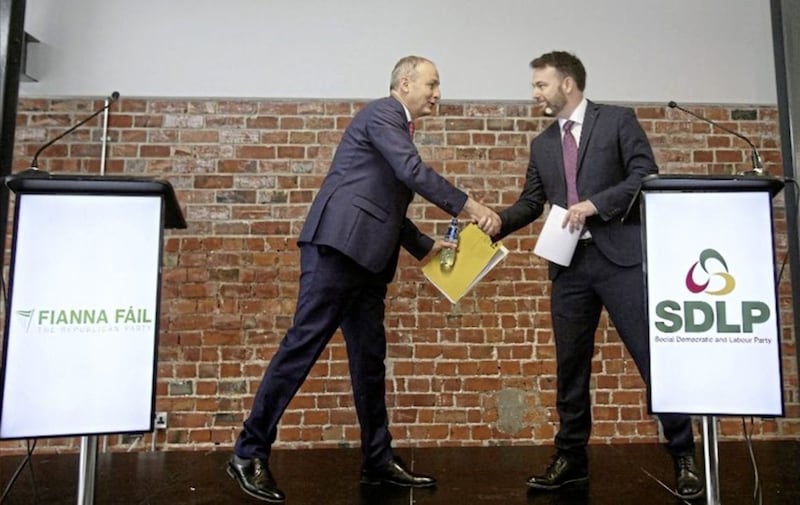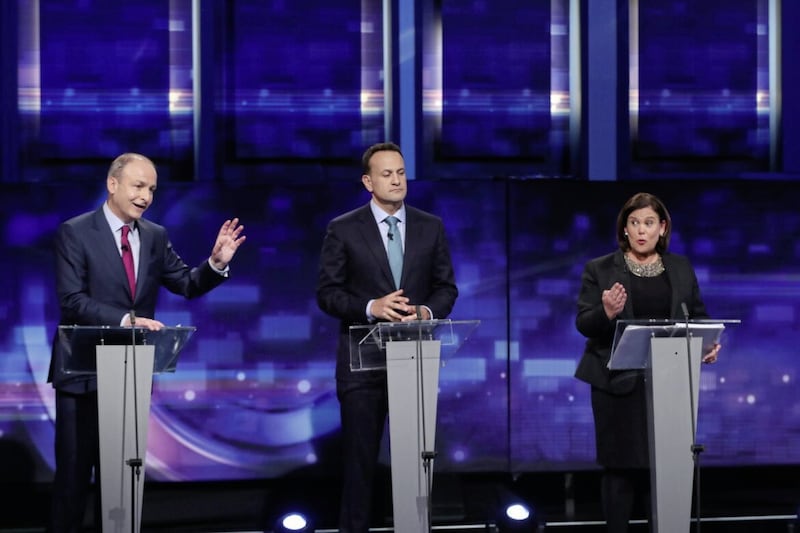For the first time in modern Irish history, Fianna Fáil’s (FF) campaign for a 26-county general election was launched at Stormont (Well, in the Stormont Hotel, actually).
In addressing the Alliance Party conference there last week, Tánaiste Micheál Martin did not mention Sinn Féin (SF), but he effectively challenged their claim to be the sole owners of a united Ireland.
Having failed to gain a northern foothold through an attempted partnership with the SDLP, FF has now sided strongly with Alliance in challenging some of Stormont’s in-built sectarianism. That same sectarianism brought SF to power and it will now use that power in the 26-county election by parading its new first minister in every constituency.
Having been denied the opportunity to criticise SF’s performance in Stormont for five of the past seven years, FF is now stepping directly into the northern political arena with cash, clichés and a condemnation of sectarianism.
Welcome to the first all-Ireland election campaign since 1918.
- Northern Ireland Former Fianna Fáil adviser calls Micheál Martin’s Alliance conference address ‘political two-timing’Opens in new window
- The SDLP needs to play hurling, not football, to survive – Patrick MurphyOpens in new window
- Patrick Murphy: Sinn Féin and Fianna Fáil are more alike than they would admitOpens in new window
Addressing the conference, Mr Martin referred to “the Alliance family”, suggesting that he was their long-lost cousin from Cork whom they never knew existed. His speech could have been written by Alliance, as he attacked the ability of one party to collapse Stormont and the abuse of the petition of concern.
He advocated a conversation on those issues, directly challenging SF’s mantra that we should have a conversation about a united Ireland.

He could have made a similar speech at an SDLP conference, but he appears to see the SDLP as a lost cause in challenging SF’s electoral dominance. He has now put his money (literally) on hoping that Alliance, rather than the SDLP, will nibble away at Sinn Féin’s support.
Alliance embraced their long-lost cousin by revealing that 24% of members support immediate Irish unity and a further 47% would be open to the idea within 10 years.
While Mr Martin is unlikely to parade Naomi Long around southern constituencies in the near future, it appears that FF’s northern campaign has switched from SF-dominated nationalism to cultivating the middle ground.
Now we have two parties, both claiming to be the republican party (and the less said about both claims, the better) and professing to offer the one true path to a united Ireland. However, since no-one knows what a united Ireland might actually look like, unity remains a vague concept.

It is a bit like heaven, elevated into the clouds by a sense of nationalist historical grievance and beseeched by present-day prayers for a border poll (but not just yet).
A united Ireland is nationalism’s new religion.
SF’s doctrine suggests we need only faith to reach the heaven of a united Ireland, which tends towards the Presbyterian tradition of “faith alone”. FF, however, is more Catholic in that it believes faith should be accompanied by good works. Hence the Dublin government’s £680 million for the A5 upgrade and other projects.
Since neither party offers a description of what heaven will look like, it is difficult to avoid the conclusion that neither is all that keen on the practicality of a united Ireland.
SF’s doctrine suggests we need only faith to reach the heaven of a united Ireland, which tends towards the Presbyterian tradition of ‘faith alone’. FF, however, is more Catholic in that it believes faith should be accompanied by good works. Hence the Dublin government’s £680m for the A5 upgrade and other projects
For example, would SF be prepared to give up its automatic entitlement to privilege, power and pomp with four guaranteed places in the Stormont Executive in exchange for a possible opposition role in an all-Ireland Dáil? Perhaps they should tell us.
Would FF be willing to create a system of compulsory Dáil coalition to allow unionists a guaranteed place in the cabinet, with the consequent loss of some FF ministerial posts? They might like to suggest that in their election manifesto.
Meanwhile as we await our ascent into heaven, we must endure the hell of a collapsed public sector in the north. Neither faith nor good works are of any consolation to those who suffer ill health, poverty or homelessness.
Maybe it is time to alter conditions in this life rather than wait for the promises of the next one – but do not expect either party to deliver on that one.




